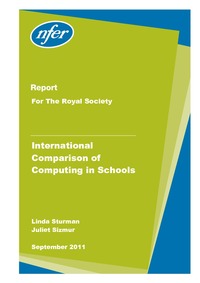International Comparison of Computing in SchoolsLinda Sturman, Juliet Sizmur
Publikationsdatum:
|
 |
 Diese Seite wurde seit 2 Jahren inhaltlich nicht mehr aktualisiert.
Unter Umständen ist sie nicht mehr aktuell.
Diese Seite wurde seit 2 Jahren inhaltlich nicht mehr aktualisiert.
Unter Umständen ist sie nicht mehr aktuell.
 Zusammenfassungen
Zusammenfassungen
The outcomes from this small-scale international comparison highlight variability in ICT and Computing education internationally, as well as identifying some areas of common ground. They are not intended to represent an exhaustive survey, but to be useful indicators. They are potentially useful in informing discussions about how to motivate students to pursue their ICT and Computing education. They may also be useful in considering what works or might usefully be developed in our own curricula in the UK. The key findings are as follows:
Von Linda Sturman, Juliet Sizmur im Text International Comparison of Computing in Schools (2011) - A wide range of labels is used internationally to describe the subject areas of ICT and Computing, ranging from Information Technology or Technology Literacy to Informatics and Computer Sciences, Computer Studies or Computer Engineering Technology.
- In the sampled countries‟/regions‟ curriculum documents, the subject labels Information and Communication Technology and Digital Literacy are not used.
- In some educational systems, the subject is not represented in the curriculum.
- In some it is optional and in others mandatory.
- Approaches to the subject vary. Use of ICT as a tool is generally integrated and cross-curricular at the elementary stage of schooling, even in countries where it is not included in the curriculum.
- At upper primary and secondary level, the subject areas are usually taught as discrete elements.
- The use of ICT is included in the curriculum more commonly than the technical aspects of Computing, such as programming.
- The age at which the teaching of ICT is expected by the curriculum varies, from introduction at or before age 6 in Ontario and Massachusetts to first introduction at the age of 12 in Singapore and 14 in Italy. There is evidence, however, that many students use ICT earlier than the curriculum implies.
- Younger students are generally expected to use ICT for activities such as producing and presenting text, making presentations and carrying out internet searches. Computers are also used across the curriculum, in subjects as varied as the arts, physical education and mathematics.
- Safe and secure use of ICT tends to be included in the curriculum. Massachusetts, unusually, sets out an expectation for keyboarding skills.
- The introduction of more technical Computing skills occurs later, typically from the ages of 12-14 upwards.
- In terms of basic technical Computing skills, students are generally expected to know common terminology, to understand concepts such as „hardware‟ and „software‟ and to be able to name parts of a computer system, among other elements.
- Programming is covered in most Computing curricula investigated. In some, specific languages are identified, while in others, there is flexibility (e.g. Ontario simply specifies that programming languages should be „industry standard‟).
- Only the older students are exposed to the technicalities of networking and systems management, and then not in all countries/regions.
- Curriculum design varies. Most courses are linear, while Ontario offers a menu of Computing courses at the higher levels, from which students can select courses tailored to their different interests and aspirations.
 Dieser Text erwähnt ...
Dieser Text erwähnt ...
 Dieser Text erwähnt vermutlich nicht ...
Dieser Text erwähnt vermutlich nicht ... 
 Nicht erwähnte Begriffe | blockbasierte Programmierumgebungen, Informatik-Didaktik, Informatikunterricht in der Schule, LehrerIn, Lehrplan 21, Unterricht |
 Tagcloud
Tagcloud
 Zitationsgraph
Zitationsgraph
 Zitationsgraph (Beta-Test mit vis.js)
Zitationsgraph (Beta-Test mit vis.js)
 3 Erwähnungen
3 Erwähnungen 
- International Computer and Information Literacy Study - Assessment Framework (Julian Fraillon, Wolfram Schulz, John Ainley) (2013)


- Preparing for Life in a Digital Age - The IEA International Computer and Information Literacy Study International Report (Julian Fraillon, John Ainley, Wolfram Schulz, Tim Friedman, Eveline Gebhardt) (2014)


- Second Handbook of Information Technology in Primary and Secondary Education (Joke Voogt, Gerald Knezek, Rhonda Christensen, Kwok-Wing Lai) (2018)


- 4. Students and Their Computer Literacy - Evidence and Curriculum Implications (John Ainley)


- 4. Students and Their Computer Literacy - Evidence and Curriculum Implications (John Ainley)
 Volltext dieses Dokuments
Volltext dieses Dokuments
 |  Interantional Comparison of Computing in Schools: Artikel als Volltext ( Interantional Comparison of Computing in Schools: Artikel als Volltext ( : :  , 708 kByte; , 708 kByte;  : :  Link unterbrochen? Letzte Überprüfung: 2020-11-28 Letzte erfolgreiche Überprüfung: 2018-11-28) Link unterbrochen? Letzte Überprüfung: 2020-11-28 Letzte erfolgreiche Überprüfung: 2018-11-28) |
 Anderswo suchen
Anderswo suchen 
 Beat und dieser Text
Beat und dieser Text
Beat hat Dieser Text während seiner Zeit am Institut für Medien und Schule (IMS) ins Biblionetz aufgenommen. Beat besitzt kein physisches, aber ein digitales Exemplar. Eine digitale Version ist auf dem Internet verfügbar (s.o.). Es gibt bisher nur wenige Objekte im Biblionetz, die dieses Werk zitieren.









 Internet
Internet Mathematik
Mathematik Programmieren
Programmieren Schule
Schule Biblionetz-History
Biblionetz-History